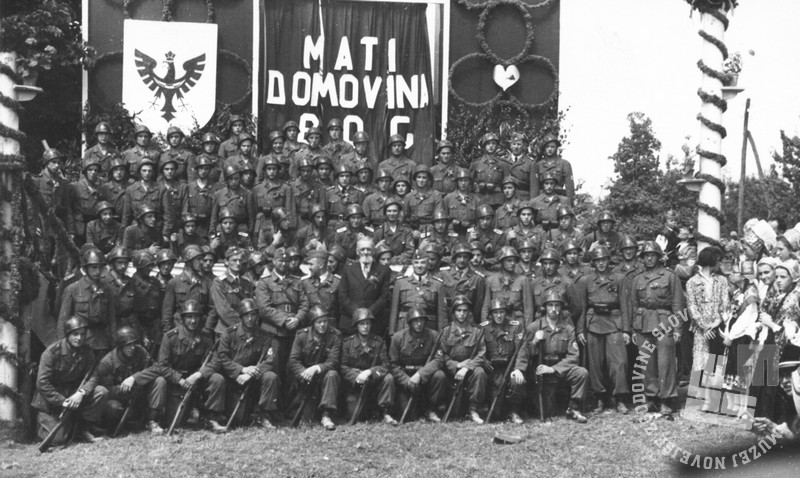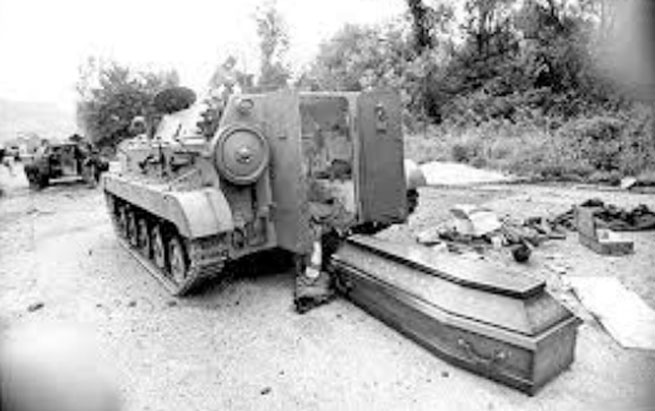Period:
Yugoslav Wars
Region:
Slovenia
The Slovenian criminal Janez Janša - (1958.)
Janez Janša (1958) is a Slovenian politician and former so-called Minister of Defense (1990-1994) involved in arms smuggling in the Balkans in the early 1990s.
During the two-week war in Slovenia in mid-1991 that had arisen from the political and economic crisis in the Yugoslav federation when the Socialist Republic of Slovenia declared independence on 25 June, it was Janez Janša who played the key role in forming paramilitary formations and in organizing attacks on the members of the Yugoslav Army, their families, garrisons, border crossings, etc.
Also, Janez Janša is responsible for taking hostages and creating about twenty concentration camps on the territory of Slovenia, which is contrary to the Geneva and Hague war conventions. The paramilitary under his command also used illicit chemicals prohibited by international war regulations.

Janša was part of a joint criminal enterprise together with President Milan Kučan, Prime Minister Alojzije Peterle,, Igor Bačvar, etc, since they performed ethnic cleansing on the territory of SR Slovenia by expelling tens of thousands of Serbs through a system of intimidation and confiscation of their property.
In addition, Janša was later accused by Austrian journalists of organized crime, i.e. arms smuggling, which in 1991-1993 went through the Slovenian territory intended for Croatia and Bosnia and Herzegovina. After Slovenian independence, Janša was never held responsible for the scandals in which he was involved, and he was appointed Prime Minister three times.
By the way, during his political activity, Janša changed as many as four ideologies.
BIOGRAPHY
Janez Janša was born in Grosuplje on 17 September 1958. His first name was Ivan, and he was named Janez at his baptism in the parish church of St. Michael. He grew up in a strict Roman Catholic family.
He married twice. He has a son and a daughter from his first marriage with Silvija Predalič, and two sons from his second marriage with Urška Bačnovik.
He has written and published several books in which he deals with sociological, social, and strategic (security) topics.
Origin and education
During World War 2, his father was an active member of the Slovenian Home Guard, the quisling armed formation loyal to Adolf Hitler and an ally of the Wehrmacht. He had fought in the Dobrovac detachment, but after 1945, due to his young age, he avoided the communists’ revenge (imprisonment or death) for being a member of the fascist units.

Slovenes loyal to the Fuhrer of the Third Reich
He finished primary school in his hometown, which is 20 km south-southeast of the city of Ljubljana, and high school in the neighboring town of Stičina.
He went to Ljubljana to study and he graduated from the Department of Defense and Protection in 1982 at the Faculty of Political Science, Journalism, and Sociology. He then got a job at the military department, that is, the Secretariat for the National Defense of SR Slovenia.
Dissident
During his high school days in 1975, Janša joined the League of Communists of Slovenia and became an active member. He performed the function of the president of the youth in the party.
Janez Janša was expelled from the communist party in 1983 because he had criticized the defense system of socialist Yugoslavia and the functioning of the Yugoslav People’s Army. Although he appealed, the appeal was rejected and he was fired. He got a job as a newspaper editor.
In the following years, Janša again harshly criticized the JNA which caused him new problems, and his passport was confiscated. He became a target of the secret police that had monitored his and his associates’ work.

The beginning of his political activity 1988
He could not get a job in state institutions or companies. He earned his income as a mountain guide and by writing computer program codes in a company, but he set up his own software company later.
In the second half of the 1980s, Janša intensified his social activity and became a prominent member of the Slovenian Pacifist Movement. He met Igor Bačvar at the time.
Arrest and trial
Due to the suspicion that he was in possession of a confidential document about the Yugoslav People’s Army and wanted to publish it in the magazine Mladina, Janša was arrested by the Counterintelligence service. He was arrested with three colleagues.
That is how Janša was brought before a military court and sentenced to 18 months in prison in a process known as “The Trial of Four”. This provoked a large wave of demonstrations throughout Slovenia.
CRIMINAL ACTIVITY
At the end of 1989, when the introduction of a multi-party system in Yugoslavia was already in sight, Janša and his associates founded the Slovenian Democratic Union party and became its vice-president, and later, president.
After the end of the first multi-party elections in May 1990, Janez Janša was invited to the Government of the Socialist Republic of Slovenia formed by Prime Minister Alojzije Peterle. He got the function of the so-called Minister of Defense of the republic that was part of the SFRY.
His colleague in the Government was Igor Bačvar, who was the Minister of the Interior, so the two were in charge of “creating the army” since Slovenia, as one of the Yugoslav republics, did not have an army, but Slovenian separatists wanted to settle accounts with the JNA.
After the referendum on independence in SR Slovenia on 23 December 1990, tensions increased and the political crisis in Yugoslavia deepened.

Brothers in irredentism: Bačvar and Janša
At that time, a joint criminal enterprise was made, that is, a plan for the ethnic cleansing of Slovenia from Serbs and the Yugoslav People’s Army. In fact, the JNA had a large number of garrisons and members on Slovenian territory because such was its geostrategic position, given the proximity of the borders with the neighboring countries.
Infantry weapons were procured mostly illegally (semi-automatic rifles, hand grenades, etc), and Janša himself was involved. In the spring of 1991, many of the JNA officers were recruited or pressured to join the Slovenian side for a good salary.
Janša organized the Slovenian Territorial Defense (STO) which got weapons, and the reserve police force was increased four times. The goal was to prepare for an encounter with the JNA, as they knew that the declaration of independence would provoke a reaction from the Federal Government in Belgrade and the Yugoslav General Staff. Almost all conscripts had to report to military units under Janša’s control in June. The units were replenished and they got weapons.

At the beginning of June 1991, Janez Janša also had a meeting with Croatian separatists Dobrosav Paraga, Ante Paradžik, and others, who made a secret agreement on sending two battalions, i.e. 500 Croatians to SR Slovenia to help fight the JNA and Serbs, while Slovenes in turn sewed uniforms for the so-called Croatian Defense Forces (HOS), the Croatian paramilitary formed a few months earlier that also trained Paraga’s HOS forces in terrorist camps.
On 25 June 1991, the Assembly of the SR Slovenia officially declared the independence of this republic, contrary to the Constitution of the SFR Yugoslavia. The encounter with the JNA and ethnic cleansing of Serbs started the following day. This meant blockades of barracks and federal institutions, all military facilities, and border crossings. Regional roads were also blocked, as well as the highway itself. There were murders of civilians, truck drivers from other republics, mostly from SR Serbia and SR Bosnia and Herzegovina.
In addition, residential areas and buildings in Ljubljana, Maribor, Dravograd, and other Slovenian cities where the families of Yugoslav officers lived, were also blocked, and the women, children, and the elderly were abused both psychologically and physically. This was mostly done at night which caused additional fear. Slovenian paramilitary and police formations respected almost none of the provisions of the Geneva and Hague war conventions because they were shooting at the wounded or vehicles with visible Red Cross insignia.

The attack on border crossings started at dawn
During the two-week war in Slovenia, a whole series of war crimes was committed, and surviving soldiers and officers of the JNA testified about them before the investigating authorities. Slovenian forces often cowardly took officers’ women and children in front of them as human shields, which forced many officers to surrender.
The members of the Federal Police, i.e. the Secretariat of Internal Affairs of the SFRY and the Federal Customs Administration, who were officially sent from Belgrade to Slovenia to prevent the unconstitutional decisions, were arrested and abused physically and psychologically.
There were at least 21 concentration camps on Slovenian territory where the following were imprisoned: soldiers, officers, federal police officers, customs officers, civilians…among them, the best known were: Dol pri Hrastniku, Dob pri Mirni, Škofije near Kopar, etc. Janša was very well aware of all this, but nothing was done to stop the evil.

Coffins announcing the dark years
When the Brioni Agreement was signed on 7 July 1991, Janša and his associates rejoiced because they had won the independence they had never had before. According to the provisions of the agreement, the JNA had three months to withdraw from Slovenia.
ORGANIZED CRIME
As soon as the armed conflict in Slovenia ended, Janez Janša started smuggling weapons for his account because he had connections and the market was looking for such people.
Although there was an embargo on the territory of former Yugoslavia, he smuggled weapons to Croatia and Bosnia, and Herzegovina and got rich. The Austrian journalist Richard Schneider testified about this and even wrote a book entitled “Šta nam možete?” (“What can you do to us?”), in which he stated that Janša took a commission of 250,000 USD per ship. He was even charged in 1995 with the criminal offense of arms smuggling, but the trial never took place.
During his political career, Janez Janša was repeatedly accused of being involved in numerous corruption scandals, but he always found loopholes in the law and got away with it.
GOVERNMENT OFFICIAL
After Slovenia had gained its independence and was recognized by the United Nations, Janez Janša held several high state positions. Although Prime Minister Janez Drnovšek relieved him of his duty in 1994 due to his involvement in the Depala Vas (or Milan Smolnikar) affair which spoke of an alleged coup. Janša managed to avoid trial and imprisonment.

Welcoming Angela Merkel in 2011
He was Prime Minister of the Government of Slovenia twice: 2004-2008, 2012-2013, and also the President of the European Parliament in 2008 when Slovenia held the Presidency of the European Union, where it was admitted in May 2003.
He has also been the Prime Minister of the Republic of Slovenia since 2020 and leads the Slovenian Democratic Party.
Tags:
Please, vote for this article:
Visited: 3965 point
Number of votes: 699
|